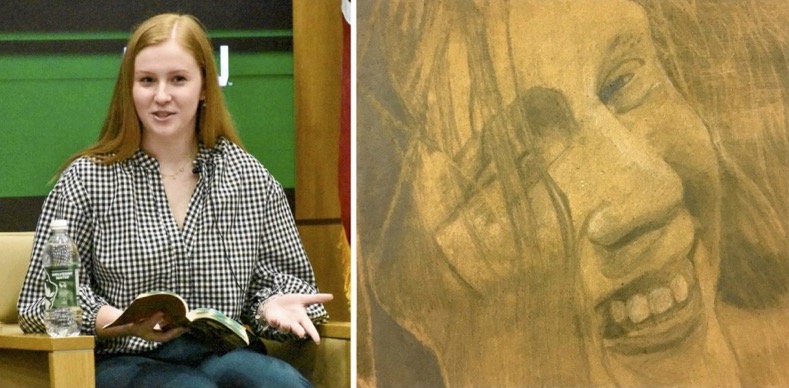By Hank McIntire
 Grace Dinsdale, a co-team lead in the UVU Center for Constututional Studies, and her award-winning pencil-sketch self-portrait, entitled I on Me.
Grace Dinsdale, a co-team lead in the UVU Center for Constututional Studies, and her award-winning pencil-sketch self-portrait, entitled I on Me.
Growing up listening to the strains of “The Eyes of Texas Are Upon You,” Grace Dinsdale was driven to achieve. The Tyler native made her mark both on and off the field at Brook Hill School. She competed in volleyball, basketball, softball, and track, was a varsity cheerleader, and won awards for her artwork in acrylic and pencil mediums.
“My favorite part of high school was the quick flip of playing sports and doing cheer,” she recalled.
Grace also held her own in the classroom, counting history and English as her favorite subjects. She remembers two instructors who had a profound effect on her.
“We had an amazing humanities teacher—Dr. Lee,” Grace said. “I first thought it would be awful, but he taught us about logical fallacies and a lot of other really cool things. And my history teacher when I was a senior, Mr. Dement, had some interesting artifacts. He founded a history museum in our school library.”
Those experiences led to Grace’s decision to study history at UVU, but it wasn’t long before she made another “quick flip” and adjusted her major to History Education at her mother’s suggestion.
“I enjoy presenting and being out front, and Mom knew I was thinking about being a teacher, so her recommendation to add education to my program made a lot of sense,” she said.
After her 2021–2022 freshman year, Grace signed up for a UVU study-abroad course, Foundations of Constitutionalism, taught by Dr. Nicholas Cole at Pembroke College, Oxford. She loved the course, and at Cole’s encouragement, she applied to work as a Wood research assistant in UVU’s Center for Constitutional Studies on the Quill Project, a research effort started by Cole himself to digitally model the negotiations of each U.S. state’s constitutional convention.
“I did terribly in my interview, but I think they hired me because of Dr. Cole’s recommendation,” Grace said with a smile.
She started at CCS on Constitution Day 2022, commemorated on Sept. 17, when in 1787 the Constitution was formally ratified and signed.
“I have always liked the Founding era, but I never thought of it as extensively as I do now,” Grace said. “I’m intrigued by how different each state is, how each has its own needs, and shapes its constitution around what it needs and the time period when it was written.”
“I’m learning about these things in my history and political-science classes,” she continued, “but to see them play out in the conventions, it really shows another dimension of history. It comes alive.”
Grace began at CCS as a researcher on the North Dakota and South Dakota conventions and became fascinated by the role of women in the founding of U.S. states.
“Women wanted to be involved, but culturally they were prevented from doing so,” she explained. “In Ohio there were 100 petitions sent by groups of women about various things. They really wanted to be heard because they were living there too. The convention made an effort to discuss the things brought up in the petitions.”
“I see it as a precursor to all of the other women’s movements throughout the rest of American history,” Grace continued. “It created a precedent for women in the future to voice their opinions and their concerns and take part in the civic process. That does a lot for women now.”
Grace’s passion for her work on Quill caught the eyes of CCS leadership, and this past year she was appointed a co-team lead for a National Archives-funded project.
“I’ve seen a lot of growth in the people on my team and the confidence they have in themselves,” she observed. “I have tried to set a tone of openness and trying to be helpful and enjoying what we do. We really do make each other better.”
Grace tries to apply leadership lessons she learned when she was figuring things out as a teenager.
“A lot of students—girls and boys—need that kick of self-confidence and have more faith in themselves,” she said. “I didn’t have a lot of confidence in high school, and when I moved up here, I told myself I wasn’t going to be like that anymore. A lot of people need someone to tell them that.”
Another thing Grace has gleaned from her time at CCS is that people are the most important focus.
“It’s not about the content of what we’ve been doing; it’s learning how to be a solid person, a good leader, a good team member,” she said.
Among the Washingtons, Jeffersons, and Hamiltons of the Founders, Grace’s favorite is Dolley Madison.
“She was the first of presidential wives to be called the ‘First Lady,’” she said. “Dolley was a strong figure and came to be known as the mother of American civility because of her great kindness and compassion.”
“It’s good to have female role models in history,” Grace continued. “They may not be extraordinary people, but they do extraordinary things. It’s a good indicator that I can do extraordinary things too.”
After graduation in 2025, Grace plans to be in a high-school classroom—somewhere in the Lone Star State, where the eyes of Texas and her students will be upon her—teaching history with a keen focus on our nation’s founding documents.
“I hope I can show my students the good in the Constitution and to build upon those things,” she said. “I want them to choose for themselves and make decisions about their lives without the government impeding their agency. The Constitution is a really important part of that.”